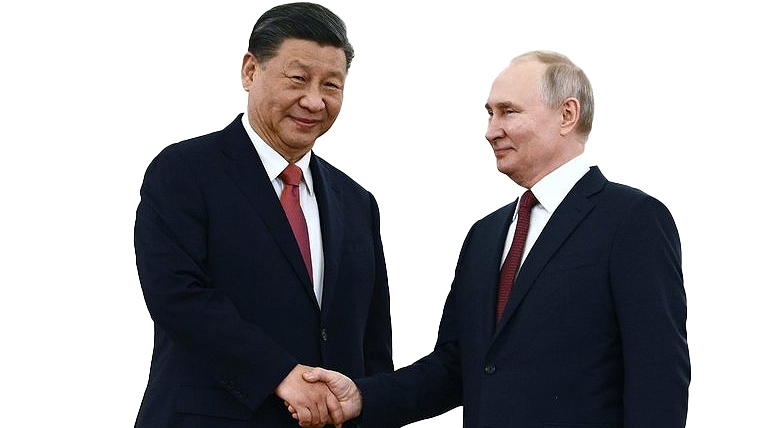
Wagner Group leader Yevgeny Prigozhin may have played his assigned role by reportedly meeting with Russian President Vladimir Putin in the Kremlin on June 29. But notwithstanding the contrived show of unity, it will not have been lost on Chinese President Xi Jinping that Prigozhin’s highly public mutiny last month has profoundly weakened the Russian leadership. With Ukraine on a counteroffensive and Russia’s battlefield losses mounting, Xi’s “no limits” partnership with Putin is quickly morphing into a military liability for China.
Of course, China insists that the Wagner Group’s abortive putsch did not threaten its own cooperation with the Kremlin. Just hours after Prigozhin halted his march on Moscow, the Communist Party of China issued a statement dismissing the revolt as an internal matter. Inside China, news of Prigozhin’s uprising has been sparse, because censors have sanitised Chinese social media of any hint that Putin may have been taken down a peg. State media have duly reiterated the regime’s support for Russia, portrayed the Western reaction as overblown, and declared Putin’s position to be secure.
It is understandable that Xi would maintain this façade, given how often he has waxed rhapsodic about China’s ties with Russia and his personal relationship with Putin. The two men have met some 40 times over the past decade, repeatedly avowing a shared worldview. Putin launched his invasion of Ukraine shortly after Xi had announced their “no limits” partnership, and handshake photos during Xi’s visit to Moscow in March – three days after the International Criminal Court indicted Putin for war crimes and issued a warrant for his arrest – conveyed that their bond remained strong.
In the multipolar world that China touts, Russia remains key to constraining the United States and its allies. The “comprehensive strategic partnership” that Xi and Putin announced in March encompasses everything from cooperation on “de-dollarisation” to pursuing parallel policies in Iran, Syria, and Africa – where China’s investments and rising profile complement Russia’s growing military and political presence. Notwithstanding the consequences of Russian aggression in Ukraine, Xi has emphasised that China’s strategy vis-à-vis Russia “will not be changed by any turn of events … no matter how the international landscape may change.”
Xi also is ever mindful of maintaining stability at home. The last thing China’s economy – already facing intensifying headwinds – needs is rocky relations with Russia. Faltering industrial output, weak consumer demand, and flagging exports are all hampering China’s post-COVID recovery. Although Russia accounts for only 3% of China’s total trade, bilateral trade grew 30% in 2022, and has already grown another 41% as of May. China is buying Russian oil and gas at a deep discount, and its exports are helping Russia sustain the war and keep its economy afloat.
Moreover, Xi is deeply invested in Sino-Russian military cooperation. On his watch, defense relations accelerated following Russia’s 2014 annexation of Crimea and incursions into eastern Ukraine, despite the sanctions that followed. While bilateral defense cooperation may have plateaued since 2020, China is still benefiting from access to Russian advanced weapons, military exchanges, joint exercises, and high-tech air, naval, and early-warning systems.
But as important as such tangible returns may be, China cannot ignore the growing intangible liabilities associated with its ties to Russia. After 16 months of battlefield failures, the Russian armed forces have lost 50% of their combat effectiveness, Britain’s military commander estimates, with the United States putting the number of Russian casualties at more than 100,000 just since December.
It is safe to assume that China’s own generals are both stunned and disappointed by these results. The last war China fought was almost a half-century ago, against Vietnam. Any hope that it had of drawing fresh insights from a winning Russian playbook in Ukraine have now been dashed.
The factors behind Putin’s failures should trouble Xi personally. Consider Russia’s competing chains of command and constant reshuffling of generals in Ukraine. China’s military brass will be wondering what to expect in any East Asian conflict that calls for joint operations with Russia.
Even without the Kremlin’s incompetence and confusion, the US government-funded Center for Naval Analyses concludes that Russia and China have a long way to go in creating an effective military partnership. As matters stand, “The episodic establishment of joint operation centers and the occasional use of each other’s military facilities remain the only cases of advanced military cooperation.”
Even more important for Xi, Russia’s muddled decision-making is not confined to the battlefield. As the Carnegie Endowment’s Mikhail Komin suggests, the military’s tepid response to Prigozhin’s putsch raises basic questions about its loyalties. Xi is already familiar with this problem. As part of his sweeping anti-corruption campaign in the 2010s, he oversaw a highly publicised purge of the Chinese military to root out competitors and critics. One wonders what was going through his mind as the Wagner Group marched on Moscow while Russia’s armed forces did nothing.
China doubtless has its own view about Prigozhin and the specific Russian military leaders whom he sought to challenge – namely Minister of Defense Sergei Shoigu and General Staff Chief Valery Gerasimov. But these are only a few of the many players in the Kremlin’s internecine struggle for position and privilege.
Others include Shoigu and Gerasimov’s respective predecessors, Anatoly Serdyukov and Nikolai Makarov. A decade ago, Komin reminds us, they led a reform program to revamp the military, ultimately discharging some 80% of the Russian Army’s colonels and 70% of its majors. That house cleaning opened the doors for new officers who are not beholden to today’s incumbents. These players are stationed across Russia’s 11 time zones and up and down its chain of command, and where their loyalties ultimately lie is anyone’s guess.
Likewise, it remains to be seen whether the questionable integrity of Russia’s chain of command will fundamentally change Xi’s strategic calculus or global designs. The fact that Russian security services reportedly have detained at least 13 senior military officers and suspended or fired 15 others following Prigozhin’s revolt can only be troubling for Beijing. For now, however, it would appear that Xi cannot do without even a weakened and humiliated Putin.
Kent Harrington, a former senior CIA analyst, served as national intelligence officer for East Asia, chief of station in Asia, and the CIA’s director of public affairs. Copyright: Project Syndicate, 2022, published here with permission.
8 Comments
China is doing everything it can to piss off the West. It’s self defeating
Audaxes,
Still, it is a remarkable recovery. By his skillful management of the battles in Ukraine, Vlad has shown his countrymen an overwhelming concern for their safety. Whether civilian or military, they understand his patient prosecution of the Special Military Operation. And they appreciate his ranking of safety over vengeance. They have responded in kind. The people are firmly behind him, as they flock to the enlistment centers.
Really?
Do you approve of the activities of Vladimir Putin as the president (prime minister) of Russia?
In May 2023, over 80 percent of Russians approved of activities of the Russian President Vladimir Putin. The popularity level was five percent higher than in September 2022, when it stood at 77 percent. The decline in that month was explained by the announcement of a partial mobilization in the country. After Russia invaded Ukraine at the end of February 2022, the approval rating increased. During the COVID-19 lockdown in the spring of 2020, the figure declined.
Control the media. When Stalin died inhabitants of the USSR wept in the street.
Attributed to the same identity “quantity has a quality all of its own.” That maxim, that factor has yet to be fully introduced let alone fully tested. Times though have changed. The Russian citizens have much more access to information, international intelligence. Wholesale compulsory conscription is no longer as easily enforced. Raw recruits too, need much more training with todays much more sophisticated weaponry. So too the battlefields themselves. Satellite and drone surveillance both forewarn and threaten the wide scale, sweeping manoeuvres of WW2 for instance. That in turn drastically reduces the old odds on throwing out overwhelming numerical superiority of personnel and armaments. Ironically, sort of, this has re-introduced tactics more akin to the trench and urban combat of WW1 laced with a good topping of artillery.
In an environment where you can't trust anyone what else would you expect. While publicly people may say one thing in private they think another. Unlike in New Zealand where you can express a different point of view in Russia you can't. If you do you are imprisoned or worse.
Since the Yevgeny Prigozhin's attempted coup / munity / "march for justice" or whatever it was Russia is looking more and more brittle by the weak :-).
Igor Girkin has hinted that the Russian army may mutiny after the dismissal of Popov (shades of 1917)
https://news.yahoo.com/war-criminal-girkin-warns-army-140900186.html
(perhaps something is rotten in the state of......)
While there are true believers (such as Scott Ritter and Ianto Watt ) they seem to have an aversion to reality. The Russian mil-bloggers seem to have a better grip on the reality of the front line what is really happening. Unfortunately Putin has is curated view which doesn't match reality.
"When Russian President Vladimir Putin sat down last week with a mix of official war correspondents and bloggers, he was implicitly acknowledging three things: that the Kremlin is having trouble spinning its war in Ukraine, that unofficial commentators are in their own way as powerful as the state media machine and that the confident official narrative is failing to get much traction."
https://edition.cnn.com/2023/06/20/opinions/putin-russian-war-bloggers-…
I would argue that living in some sort of fantasy ( which is what the true believers appear increasingly resorting to) only makes it more difficult to face reality when it finally hits you in the face.
Just saying.....
If President Xi is watching closely he will see the failure of having yes men around
and he may also be reflecting on the limits of state power as autocratic Russia declines noting that the same thing is happening in China now as he throttles and seeks to control the people and markets that lifted China from third world to where it is today

We welcome your comments below. If you are not already registered, please register to comment
Remember we welcome robust, respectful and insightful debate. We don't welcome abusive or defamatory comments and will de-register those repeatedly making such comments. Our current comment policy is here.